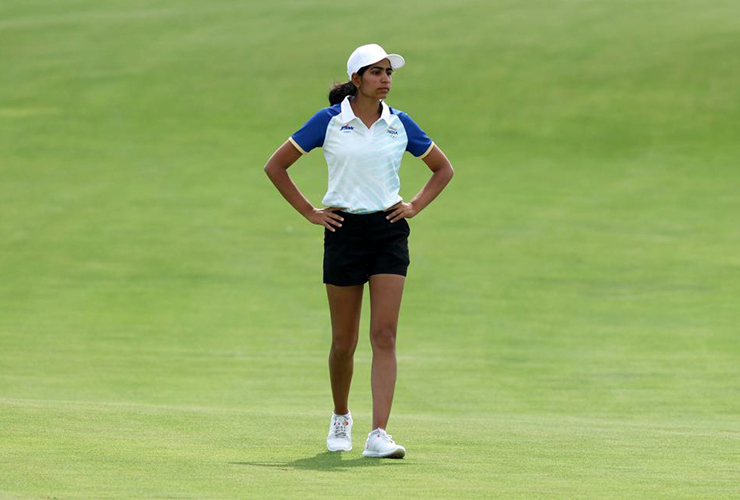It has become commonplace, almost to the point of being hackneyed, to talk about how golf reveals character. That the game’s demands of dealing with bad breaks toughens the soul to navigate the challenges of real life.
When India’s Diksha Dagar three-putted the 18th green to drop out of a tie for third after the first round of the women’s golf competition in the Olympics, you could be impressed at how she handled her post-round session with the media. Ranked 165th in the world and plying her trade in any events she can get in, whether it be on the Ladies European Tour or the Epson Tour, Dagar matter-of-factly shouldered the blame for the final mis-read and resolutely committing to getting back to work for the second round in the biggest tournament of her young life.
But you’d be missing the point. Because not only was the 23-year-old playing on her biggest stage, but doing it for the first time without her dad on her bag. Not only is Dagar recovering from an auto accident that put her mother in the hospital last week during the Games. She also happens to be deaf. There is nothing not to be impressed about from this woman.
Dagar made three birdies while ranking 11th in strokes gained/off the tee and fifth in strokes gained/putting for the first round at Le Golf National, posting a one-under 71 to be just one of 12 players to break par on Wednesday. While her best finish this year has been top-sixs in the JoBurg Ladies Open (T-3) and the Ladies Italian Open on the LET (T-6), she now finds herself in T-7 after the first round, just one stroke away from bronze medal contention.
Deaf since birth, Dagar has hearing aids and reads lips, not missing a beat in answering questions. She previously has won two medals in the Deaflympics, including a gold in 2021, and became the youngest Indian player to win an LET event in 2019 (Investec South African Women’s Open) at the age of 18. This is her second start in the Olympics after finishing 50th in 2021 in Tokyo.
Dagar’s bio would be impressive enough had she not also had to deal with a bizarre accident eight days ago. She and her family had arrived early at the Olympics to begin practicing. After having a dinner with some of the Indian Olympic team, the family’s car was blindsided in traffic. The accident sent her mother to the hospital with a spinal injury, but she is now recovering at the house where they are staying this week. Her father, normally her caddie, is tending to her mother’s recovery.
“She is doing better,” Diksha said of her mother, a smile on her face that reflected as much tension as relief. “It’s OK. You can’t avoid the accident. It happened. It was nobody’s fault. I don’t know how I didn’t end up hurt, but I guess you can say it was part of my Olympic experience. It was terrible, but by God’s grace we are safe. I’m very lucky and blessed to play the Olympics a second time.”
Dagar, a left-hander, was within a shot of the lead late in her back nine before closing bogeys on 17 and 18. Like a veteran, she blamed herself, not her first-time caddie.
“On 18, I went too aggressive with the birdie putt,” she said. Sometimes it’s in your favor, and some days it is not.
“In my second Olympics, the mindset and the process is the same thing. Everything is the same, but the golf course is different. So you have to adjust according to the golf course. Some of the holes are playing very long, but it’s all right. I will manage it.”

Diksha Dagar was one of 12 golfers to break par on Day 1 of the Olympic women’s golf competition – Kevin C. Cox
Even though she has played in only three major championships in her career and less than two years ago she was ranked in the 400s, there’s no sense that Dagar seems out of her element.
“It feels nice,” she said of her experience walking the demanding Le Golf National, where the field stroke average was 74.14 and there were 254 bogeys or double bogeys or worse. Dagar’s only bogeys came on the final two holes. “I was happy, excited and a bit nervous at the same time because the Olympics is a very unique and big event, and especially because you are playing for your country,” she said. “It all can be a distraction, but this is my goal; this is my game.”
After being introduced to the game at age 6 by her father, Narinder, a colonel in the Indian army, she has been playing elite golf for more than half her life.
“When I was playing tournaments, I had no idea what I was doing, but when the people come to me and they are deaf like me, they ask, I follow you, and it’s very inspiring to see you. It feels so good, amazing. It makes me realise I’m walking on the right path, and I want to do something better and inspire them more.”
Main Image: Andrew Redington









